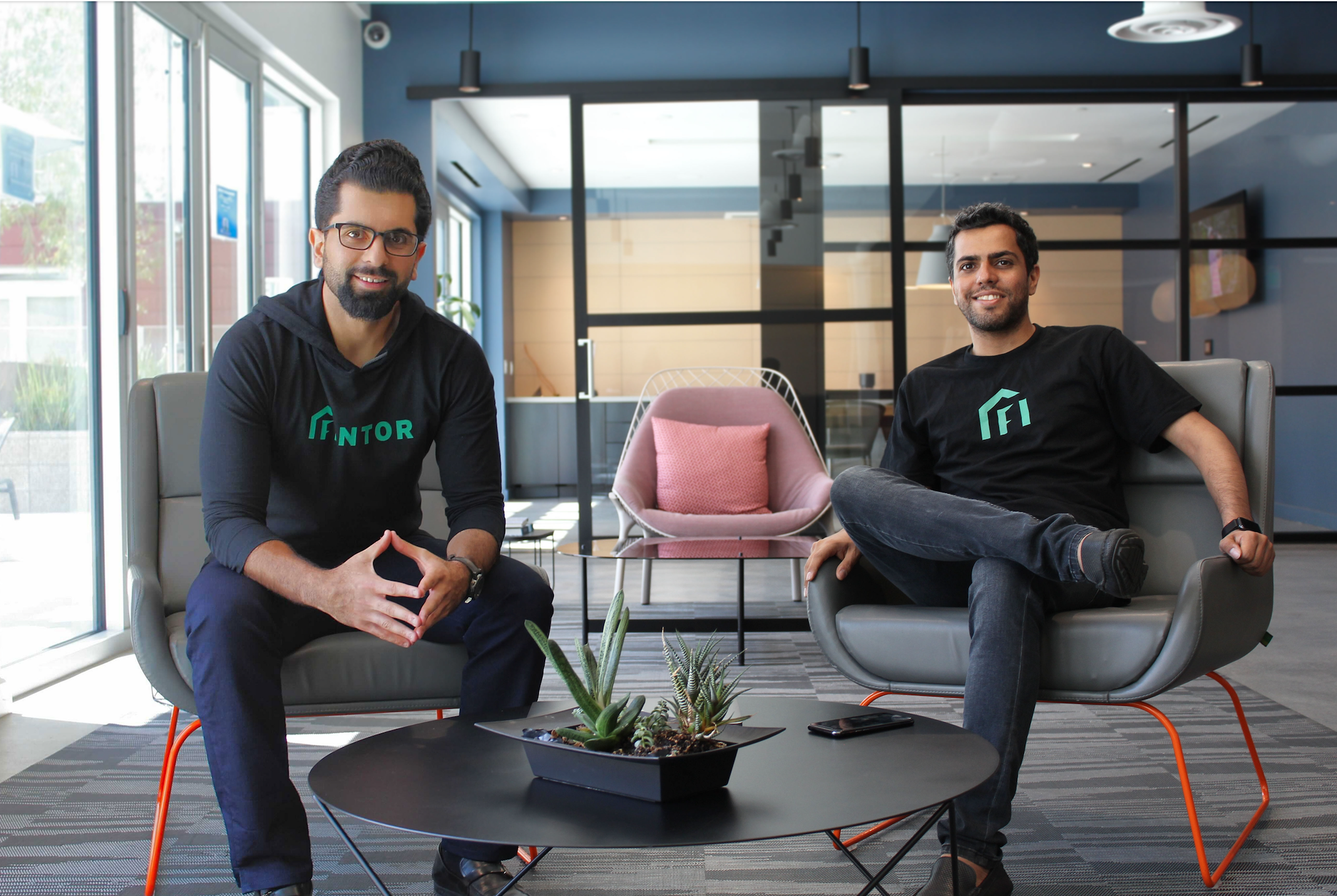There are millions of younger retail investors looking for new opportunities to grow their wealth, yet still have limited options when it comes to accessing real estate as an asset class.
2021.06.02

Clayton Bryan

Co-founders Farshad Yousefi (left) and Masoud Jalali. Picture courtesy of Fintor
By Clayton Bryan
Real estate investment has traditionally been a game for the privileged few–but the status quo is changing. There are millions of younger retail investors looking for new opportunities to grow their wealth, with a strong appetite for real estate. According to RealtyShares and Harris Interactive, more than half of Millennials are interested in real estate investing.
Yet, retail investors still have limited options when it comes to accessing real estate as an asset class, which can hamper their ability to diversify their portfolios.
Fintor aims to fix this by removing restrictions so that aspiring retail investors can participate in wealth creation and diversification. The platform allows investors to snap up fractional equity shares of real estate properties for as little as $5. This opens up real estate to a whole new swathe of investors, not just the wealthy.
The Nuts & Bolts
Problem:
The rise of the retail trader has made a remarkable impact on the investment landscape in recent years. Retail investors historically made up 10% to 14% of the market before the introduction of commission-free trading in 2014. Now they represent about 25% of the market.
That shift played out as regulation around investing has relaxed, investment tools have been greatly improved and simplified (see Robinhood), and information has become more accessible. Part of that trend traces to the crowdfunding section of the JOBS Act of 2012, which helped a wider pool of investors access opportunities once limited to Wall Street.
The issue is that most of this new access has focused on public and private equities. Only recently have we seen the JOBS Act core fundamentals get applied to other types of securities, or the securitization of collectible assets such as shoes, watches or comic books.
Against that backdrop, Millennials and Gen Z investors have felt left out of the largest asset classes of all: real estate. As of 2019, Millennials as a generation held approximately zero net real estate wealth. They face several obstacles, including large capital requirements, a complicated and time-consuming process, and low liquidity.
Solution:
Fintor’s app allows retail investors to buy fractional equity shares of real estate properties. That gives smaller-scale investors the ability to participate in real estate deals and manage diversified portfolios without needing large amounts of capital. This also enables property owners to simultaneously access new sources of liquidity.
Fintor will issue these fractional securities through a SEC approved “mini-IPO,” a process made possible by Regulation A, a crucial component of the JOBS Act. The large stakeholders (often a real estate development company) might have the option to still manage their properties while using the Fintor platform to liquidate parts of their assets.
After buying shares, Fintor users can trade them with each other after a three month lock-up period. Both primary and secondary trading is in partnership with a self-clearing broker-dealer that is SEC approved to sell shares in all states, with all transactions conducted through an escrow service.
Users access returns through monthly rental income and capital appreciation. At the right time, the asset is sold on the real estate market and cash from the final sale and any profits are distributed between shareholders and transferred into their Fintor accounts.
Fintor identifies properties by targeting neighborhoods with high rental income and fast growth potential by analyzing real estate and economic metrics, with forecasts based on local insight, proprietary surveys, and extensive data analysis. It then works with real estate investment and development firms, as well as individual owners, to source properties to list on the platform.
Getting to know Fintor:
Fintor’s founders Farshad Yousefi and Masoud Jalali bring the right combination of real estate and financial expertise and technical skills needed to build the infrastructure of an investing platform.
Farshad, who’s CEO, studied finance at the University of San Diego, while Masoud, who’s CTO, earned a PhD in engineering from UC San Diego. The pair met while attending startup events and became roommates soon after. They both shared a passion for building impactful companies, one that shapes the next generation.
Together, they helped found Visionful, a computer vision-based parking management company that was part of 500’s Batch 25 in 2019. Farshad served as COO of Visionful.ai, while Masoud provided much of the technical muscle power.
After Covid-19 impacted Visionful.ai’s business, the pair decided to sell its assets. They were already eying real estate, intrigued by the lack of access average retail investors faced, which inspired Fintor’s launch.
Fintor is also working toward UN Sustainable Development Goal #8 to promote inclusive and sustainable economic growth, Goal #10 to reduce inequality within and among countries, and Goal #11 to make the cities and towns where we live more inclusive, safe, resilient and sustainable.
Why now?
Democratizing real estate is overdue. Younger generations have flocked to investing tools such as Robinhood and are looking for more opportunities to grow and diversify their wealth across different asset classes. This trend should continue in the years ahead. Technology-driven disruption within financial markets is increasing at an unprecedented rate, and offers further potential to impact asset classes from art to precious metals. Real estate is a logical next step: the combined value of all homes nationwide rose by almost $2.5 trillion in 2020 — the most in a single year since 2005 — to a whopping $36.2 trillion, according to Zillow.
The future of Fintor:
Fintor’s goal is to make investing in real estate more intuitive and more affordable. The company already has a queue of interested retail investors signed up to adopt the platform and is lining up properties to list from a booming real estate market in the U.S.
You can learn more about Fintor at: https://fintor.com/
If you would like to learn more about companies, sectors, and trends that we are excited about as well as receive invitations to exclusive previews, and expert roundtables, please sign up here.
Legal Disclaimers: 500 Startups programs (including accelerator programs), investor education services, strategic partnership consulting services and events are operated by 500 Startups Incubator, L.L.C. (together with its affiliates, “500 Startups”) and the funds advised by 500 Startups Management Company, L.L.C. do not participate in any revenue generated by these activities. Such programs and services are provided for educational and informational purposes only and under no circumstances should any content provided as part of any such programs, services or events be construed as investment, legal, tax or accounting advice by 500 startups or any of its affiliates.
The views expressed here are those of the individual 500 Startups personnel, or other individuals quoted and are not the views of 500 Startups or its affiliates. Certain information contained herein may have been obtained from third-party sources, including from portfolio companies of funds managed by 500 Startups. While taken from sources believed to be reliable, 500 Startups has not independently verified such information and makes no representations or warranties as to the accuracy of the information in this post or its appropriateness for a given situation. In addition, this content may include third-party advertisements or links; 500 Startups has not reviewed such advertisements and does not endorse any advertising content contained therein.
This content is provided for informational purposes only, and should not be relied upon as legal, business, investment, tax or accounting advice. You should consult your own advisers as to those matters. References to any securities or digital assets are for illustrative purposes only, and do not constitute an investment recommendation, offer to sell or solicitation to purchase any investment securities, or offer to provide investment advisory services. Furthermore, this content is not directed at nor intended for use by any investors or prospective investors, and may not under any circumstances be relied upon when making a decision to invest in any fund managed by 500 Startups. (An offering to invest in an 500 Startups fund will be made only by the private placement memorandum, subscription agreement, and other relevant documentation of any such fund and should be read in their entirety.) Any investments or portfolio companies mentioned, referred to, or described are not representative of all investments in vehicles managed by 500 Startups, and there can be no assurance that the investments will be profitable or that other investments made in the future will have similar characteristics or results. Charts and graphs provided herein are for informational purposes solely and should not be relied upon when making any investment decision. Past performance is not indicative of future results. The content speaks only as of the date indicated. Unless otherwise expressly stated, figures are based on internal estimates and have not been independently verified. Any projections, estimates, forecasts, targets, prospects, and/or opinions expressed in these materials are subject to change without notice and may differ or be contrary to opinions expressed by others. All logos and trademarks of third parties referenced herein are the logos and trademarks of their respective owners and any inclusion of such trademarks or logos does not imply or constitute any approval, endorsement or sponsorship of 500 Startups by such owners. Please see Section 2 of our Terms of Use for additional important information.









